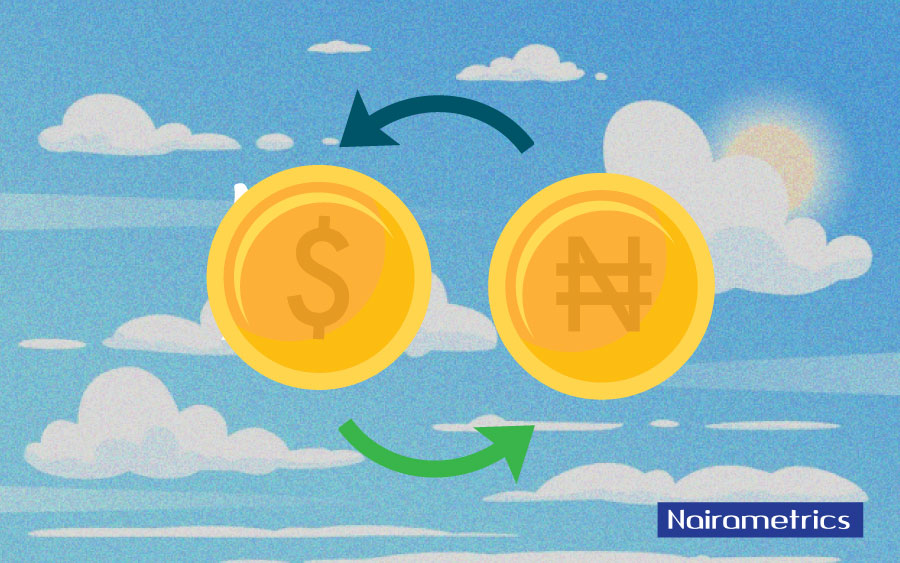The Nigerian economy has been faced with serious foreign exchange crisis since the first quarter of the year, with severe pressure on the nation’s foreign exchange market and external reserve. The local currency is under the grip of tough external pressure, characterized by internal foreign exchange shortages and consistently high black-market rates. This has led to a high disparity between the official exchange rate and black-market rate.
The undesired situation is attributable to the crash in crude oil prices, triggered by the coronavirus pandemic that has impacted negatively on the global economy. The plunging oil prices have increased the pressure on the naira, as about 90% of Nigeria’s foreign exchange earnings is from crude oil exports.
READ: Nigerian’s should expect “a significant devaluation” to N550/$1 – Goldman Sachs
Bank of Africa analysts, Rukayat Yusuf and Andrew MacFarlane, in its Global Bank’s latest report on Nigeria’s forex unification and shortages, said that Nigeria’s current foreign exchange pressure is likely to gain momentum in 2021, as the economy and imports recovery will trigger a future adjustment of the nation’s currency to N430/$1 next year.
Recall that despite several initial denials by the Central Bank of Nigeria (CBN), in response to the devastating impact of the coronavirus pandemic and oil shocks; the apex bank on March 20, 2020, devalued the exchange rate from N307/$1 to N360/$1. This was followed with the suspension of sales of foreign currency to the Bureau De Change operators on March 27, 2020, in the face of depleting external reserves.
READ: CBN injects fresh $51.8m into FX Markets
In a move viewed as attempts by the CBN to unify the exchange rate, the apex bank further devalued the naira on August 6, 2020, from N360/$1 to N380/$1 on the official window and closed the gap with the parallel market – which is the unofficial market. The huge exchange rate gap has made round-tripping very lucrative and encouraged hoarding amongst forex dealers.
Goldman Sachs analysts had earlier predicted that the exchange rate will dip to N500 to $1 in the face of rising inflation and declining external reserves. The wide gap between the official and unofficial rates is seen by analysts as an indication of increasing pressure on the forex market and dollar shortages, which the CBN is trying to contain with several policies targeted at reducing the demand for the greenback, conserve the scarce foreign exchange, and help boost dollar supply in the market.
READ: CBN announces resumption of sales of forex to BDC
Some of these policies include:
- Resumption of sales of dollars to the Bureau De Change Operators and mandating them to sell at not more than N386 to a dollar.
- Removal of third parties from buying forex routed through Form M.
- Clampdown on exporters who refuse to repatriate their export proceeds to Nigeria.
- Restriction on forex allocation to importers of maize by the Deposit Money Banks (DMBs).
READ: Nigeria’s inflation rate hits 13.71% as food prices soar
However, despite some of these measures by the CBN, the disparity between the official and black-market rates still remain as high as almost N70. So, the question is why the huge gap? Especially, with the resumption of dollar sales to the BDCs.
READ: COVID-19: How CBN policies helped prevent the collapse of the Nigerian economy – Oscar Onyema
Some analysts and stakeholders have complained that the measures are hurting business operations and pushed more demands to the parallel market. They believe it has encouraged hoarding and speculations to continue thriving; thereby, making it difficult to reduce the black-market rate.
What they are saying
While expressing his view on why the exchange rate disparity is still high, despite the resumption of dollar sales to BDCs; the President of Association of Bureau De Change Operators of Nigeria (ABCON), Aminu Gwadebe, said the impact of the resumption of sales of foreign exchange to BDCs is expected to be gradual.
READ: Naira gains across the forex markets as dollar supply rises sharply by 201%
Gwadebe said, “Firstly, the impact is gradual. You know there was a time when the dollar reached N500/$1. N474, N480 to a dollar was when there were other interventions in the market. As soon as the news of the resumption of sales to Bureau De Change broke, we witnessed the dollar going for as low as N420, N430 to a dollar. However, after taking off, the rate is now N460, which is the parallel market rate.
“Don’t forget there is a huge backlog and every other buyer – authorized or unauthorized, queued in the parallel market. So, the pressure is on the parallel market from manufacturers and existing investors. In fact, the most unfortunate behavior is hoarding and speculation.’’
READ: Ethereum whales move over $50 million of Ether to Uniswap
The ABCON President noted that people hoard and speculate when liquidity is low in the retail sector of the market. He pointed out that, although the liquidity is gradual, the rebound is expected to continue gradually.
Gwadebe said the role of the BDCs is to provide liquidity in the retail end of the market, which is what the CBN is empowering the BDCs to do and a key reason the rate has improved from the record high of about N480/$1.
Explore the Advanced Financial Calculators on Nairametrics
He noted that the resumption of sales of dollars to BDCs is discouraging frivolous demands, adding liquidity into the system, aiding return of confidence and stability in the market.
He reiterated that the BDCs remain the only threat to hoarding and speculation, while expressing satisfaction that the reserve is growing and will increase the confidence of investors.
